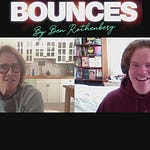While most on-court attention this week in the tennis calendar—has been on the very top of the sport—the ongoing WTA Finals and the Lorenzo Musetti’s hunt for the eighth spot at the ATP Finals in Turin, one lower-ranked player’s name—and flag—caught my eye this week.
222nd-ranked Vitaliy Sachko, a lucky loser this week at ATP 250 Metz, is a rare Ukrainian man competing at tour-level since the Russian invasion of Ukraine began more than three-and-a-half years ago.
Sachko, 28, is the only Ukrainian man currently ranked inside the ATP Top 300, playing on as he hopes to inspire his countrymen back home during what he described as an ongoing “full-scale war” in his homeland. That war, inevitably, has shifted young men—and resources—away from tennis.
“People are investing less money because everyone is donating for the drones and trying to help the army,” Sachko said.
Sachko is fighting and winning like he never has before this week, scoring his first-ever ATP-level main draw victories over formidable opponents: huge-serving Giovanni Mpetshi Perricard and the in-form 13th-ranked Alexander Bublik.
“They are fighting there, so I try to fight on court,” Sachko told me.
I spoke (via a Zoom call to the Metz players’ lounge) with Sachko after his win in a Thursday night quarterfinal over Clement Tabur, the Frenchman who had beaten him in the final round of qualifying a few days ago. Sachko, who will face Learner Tien in the Metz semifinals on Friday, is the first Ukrainian man to reach an ATP semifinal since 2017.
The full interview is available in video form above, but I wanted to highlight Sachko’s run because his presence—and his message of “Slava Ukraini” in his on-court interview tonight—should hopefully send a signal that this war is still not over, even if it is no longer top-of-mind for many around the world.
“As time went, everybody got a little bit used to it,” Sachko said of the Russian invasion of Ukraine. “But the war is still going on. I think less people [are] talking about it, and they take it as a common thing right now, which is sad. People just got tired of it, but the war is still there. It didn’t disappear.”
Thanks for reading (and watching) Bounces! -Ben





